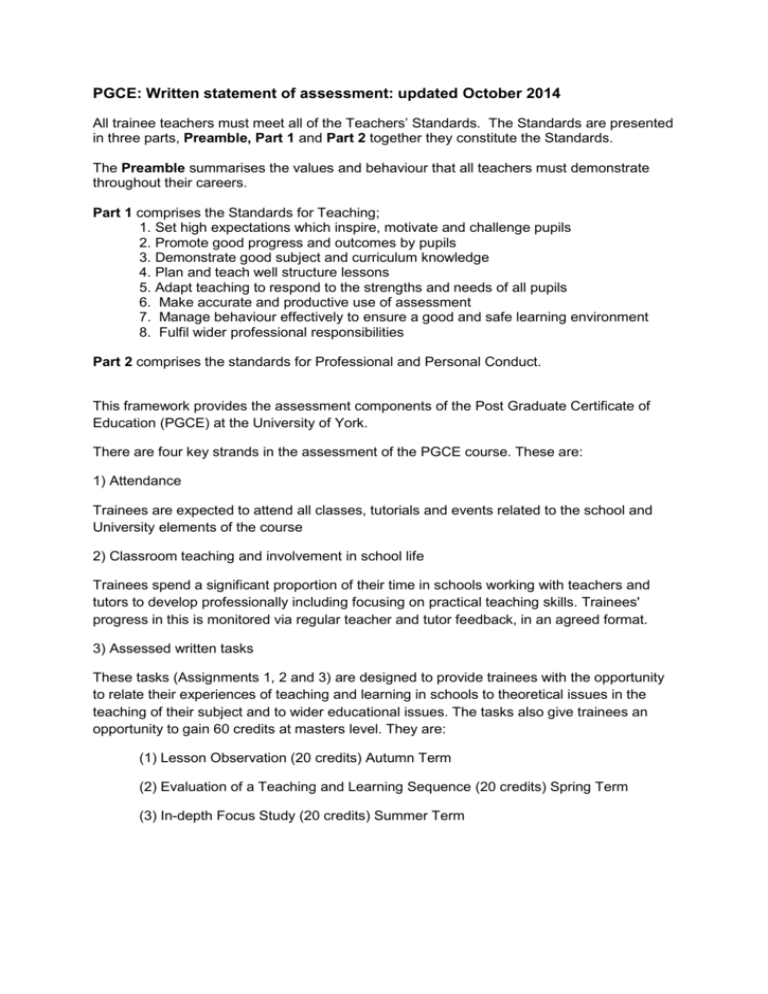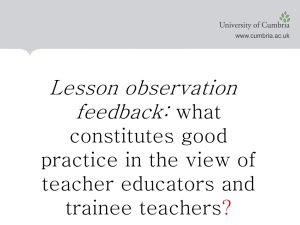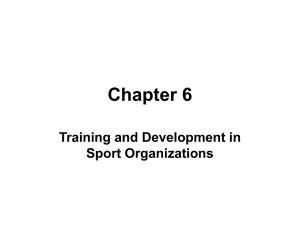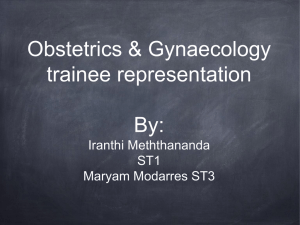PGCE - October 2014 - University of York
advertisement

PGCE: Written statement of assessment: updated October 2014 All trainee teachers must meet all of the Teachers’ Standards. The Standards are presented in three parts, Preamble, Part 1 and Part 2 together they constitute the Standards. The Preamble summarises the values and behaviour that all teachers must demonstrate throughout their careers. Part 1 comprises the Standards for Teaching; 1. Set high expectations which inspire, motivate and challenge pupils 2. Promote good progress and outcomes by pupils 3. Demonstrate good subject and curriculum knowledge 4. Plan and teach well structure lessons 5. Adapt teaching to respond to the strengths and needs of all pupils 6. Make accurate and productive use of assessment 7. Manage behaviour effectively to ensure a good and safe learning environment 8. Fulfil wider professional responsibilities Part 2 comprises the standards for Professional and Personal Conduct. This framework provides the assessment components of the Post Graduate Certificate of Education (PGCE) at the University of York. There are four key strands in the assessment of the PGCE course. These are: 1) Attendance Trainees are expected to attend all classes, tutorials and events related to the school and University elements of the course 2) Classroom teaching and involvement in school life Trainees spend a significant proportion of their time in schools working with teachers and tutors to develop professionally including focusing on practical teaching skills. Trainees' progress in this is monitored via regular teacher and tutor feedback, in an agreed format. 3) Assessed written tasks These tasks (Assignments 1, 2 and 3) are designed to provide trainees with the opportunity to relate their experiences of teaching and learning in schools to theoretical issues in the teaching of their subject and to wider educational issues. The tasks also give trainees an opportunity to gain 60 credits at masters level. They are: (1) Lesson Observation (20 credits) Autumn Term (2) Evaluation of a Teaching and Learning Sequence (20 credits) Spring Term (3) In-depth Focus Study (20 credits) Summer Term PGCE Board of Examiners The Board meets to review trainees’ progress. To pass the PGCE, and thus be recommended for QTS, trainees must have: i) met the attendance requirements ii) completed the written assignments to a satisfactory level iii) completed their block teaching placements satisfactorily iv) completed their Primary School Placement satisfactorily v) submitted their Career Entry and Development Profile satisfactorily. vi) completed their Professional Enrichment experience satisfactorily. vii) met all of the Teachers’ Standards Note: In exceptional cases the Board reserves the right to ask a trainee to satisfy any additional requirements which in its professional judgement it deems appropriate and reasonable. Elements of Self Assessment Trainees are encouraged to track and evaluate their own progress in relation to the Teachers’ Standards, and to reflect in a positive and structured way on the development of their knowledge and skills as a teacher, and upon the assignments designed to support this process. Trainees are required to self-assess against the Standards Assessment Grid prior to each of the four school reviews. They complete a self-evaluation section on each of the four reviews. The Standards Profile requires trainees to self-assess their work and experiences against the Teachers’ Standards. The course recognises the worth of selfevaluation in the learning process alongside feedback given by tutors and the teachers in schools. Assessed Written Tasks The assessed tasks (Assignments 1,2 and 3) are designed to bring together aspects of specific classroom experience with insights generated from other sources (especially those represented in literature). M Level criteria 60 credits of the PGCE are at M level. A trainee must reach the standard of an MA student in the assessed written tasks. The Assignments should show depth, breadth and independence of research. In any piece of work, the trainee will be expected to select appropriate concepts and examples, prioritise these (show judgement of their relevant importance), and relate them effectively to their chosen topic. Trainees will be expected to organise their text (into sections and paragraphs) in such a way as to guide a reader. Arguments must be backed up by relevant empirical findings or theoretical ideas. The presentation of arguments and evidence should form a structured, coherent pattern that addresses the title directly. Professional standards will be expected, in matters of spelling and punctuation, vocabulary choice, grammar, and the conventions of academic discourse. A typical assignment may be characterised by strengths in relation to some of the assessment criteria, and weaknesses in relation to others. Therefore, in reaching a decision about the grade to be awarded, the balance between strengths and weaknesses is assessed. Comprehending the Searching literature issue and developing Conceptualising and comprehending an argument Critical understanding Using evidence Linking theory and practice Relating conclusions to arguments made Reflecting on own experience, where appropriate Presenting Spelling, punctuation and sentence structure assignments Structure Use of language Referencing Additional guidance Evidence of engagement with methodological literature when completing a Presentation of the method(s) used for data collection research-based and analysis assignment Presentation and analysis of the data gathered Grades There are three categories of pass - distinguished, merit and satisfactory. 100 - 70 Distinction 69 - 60 Merit 59 - 50 Satisfactory 49 - 40 Marginal fail Below 40 Outright fail Grade descriptors The following grade descriptors are not intended to be exhaustive. They are meant as a general guidance to the qualities that examiners look for, and to indicate what kinds of weaknesses incline them to give a lower mark. The precise mark awarded for a formally assessed assignment will depend on the relative quality with which a trainee has met each of the criteria for a pass, and will generally match the descriptor. Some criteria, however, may be more important than others for different assignments. Level Grade Distinction 100 - 80 Criteria (i) (ii) (iii) (iv) (v) (vi) (vii) 79 - 70 (i) (ii) (iii) (iv) (v) PGCE specific features Excellent command of the topic, perceptive and insightful, all suggesting that the work is of publishable quality in an academic forum; Outstanding selection that makes a substantial contribution to academic debate; Outstanding use of source material; Excellent argument that is of the highest academic quality; Critical distance and outstanding analysis of the question; Referencing impeccable using appropriate APA conventions; Virtually no errors in grammar and syntax Demonstrates command of the topic by showing a high level of perception and insight – a serious contribution to academic debate; Outstanding selection from a wide, relevant and innovative range of perspectives and sources; Sources very wellintegrated into the overall argument; Clear, well-structured argument that is well crafted and cogent; Critical distance and outstanding analysis of In all assignments, references to a trainee’s own school experience, and critical reflections on what was learnt from this, are systematically integrated into the text. This is likely to mean that a variety of material will be included such as references to discussions with teachers and/or pupils. This will be very well integrated into the body of the assignment, with clear-sighted analysis, and/or provided as appended evidence (eg copies of questionnaires used). Reference to books, journal articles, university inputs and school training inputs are made as appropriate. There is very clear and systematic critical engagement with all these references. (vi) (vii) Merit 69 - 60 (i) (ii) (iii) (iv) (v) (vi) (vii) Satisfactory 59 - 50 (i) (ii) (iii) (iv) (v) (vi) (vii) the question; Referencing clear and accurate using appropriate APA conventions; Virtually no errors in Grammar and syntax. Demonstrates a good command of the topic by showing perception and insight; Selection from a wide and relevant range of perspectives and sources that draws upon contemporary academic debate; Sources well-integrated into the overall argument; Clear, cogent and wellstructured argument; Critical distance and sound analysis of the question; References clear and accurate using appropriate APA conventions; Near perfect grammar/spelling/ syntax. Shows understanding of contemporary academic debate; Relevant selection from a relevant range of perspectives and sources; Sources mostly wellintegrated into the overall argument; Mostly clear and wellstructured argument; Demonstrates criticality and reasonable level of analysis; Referencing clear and mostly accurate using appropriate APA conventions; Satisfactory level of grammar/spelling/ syntax with some In all assignments, references to a trainee’s own school experience and critical reflections on what was learnt from this are integrated into the text. This is likely to mean that a variety of material will be included such as references to discussions with teachers and/or pupils. This will be integrated into the body of the assignment, with analysis, and/or provided as appended evidence (eg copies of questionnaires used). Reference to books, journal articles, university inputs and school training inputs are made as appropriate. There is good critical engagement with all these references. In all assignments, a trainee’s own school experience, and reflections on what was learnt from this, are evident in the text A variety of material will be included such as references to discussions with teachers and/or pupils in the body of the assignment and/or appended A range of background reading, along with reference to university inputs and school training inputs as appropriate. There will be some evidence of critical Marginal fail 49 -40 (i) (ii) (iii) (iv) (v) (vi) (vii) Outright fail Below 40 (i) (ii) (iii) (iv) (v) (vi) (vii) errors. Demonstrating reasonable understanding but largely descriptive; Relevant but not wide selection of resources; Sources sometimes not properly integrated into the argument; Some attempt at presenting argument coherently; Some successful analysis but has a tendency to accept the source material at face value; References adequate but need to be clearer and/or more references needed; Reasonable grammar/spelling/ syntax but with several errors. Limited/poor understanding demonstrated, and irrelevant material included; Some/minimal relevant sources and limited topic coverage; Sources only occasionally/not at all integrated into the argument; Some/minimal structure and argument present; Limited/analysis and criticality; merely describes sources; References limited/inappropriate; Many errors in grammar/spelling/ syntax making it difficult/impossible to read. engagement with these. The trainee has not yet demonstrated the ability to write at M level. There will be little or no sense of a developing professional who has understood school experience through his or her own teaching, discussions with others or reading. Professionalism will not have been demonstrated in the presentation of the piece The key criterion is the overall intellectual scholarship displayed in the trainees’ writing appropriate to M Level in a PGCE programme. This is reflected in their understanding of the topic they are writing about, and their critical sensitivity to and awareness to the key ideas involved. As such, for example, displaying a poor grasp of the key ideas in an assignment is such a serious shortcoming, that even if the trainee addressed several of the other criteria very well, the overall mark would be unlikely to reach the level of distinguished. Marginal fail (40 – 49) Assignments of this standard will typically demonstrate failure to meet some or all of the pass criteria. For example, the assignment may display a clear misunderstanding of key ideas, or make use of a very restricted or inappropriate set of sources, or contain a number of passages which are incomprehensible. For PGCE, this could mean there is insufficient discussion showing the interrelationship between professional practice, research evidence and theoretical perspectives. Another serious shortcoming would be that the guidance for the assignment contained a specific requirement which was not met. For PGCE, the main reasons for fails in the past have been a combination of the following; failure to relate assignments to a trainee’s own experience in school failure to engage with the background reading, including primary sources where appropriate, or to achieve a proper balance between theory and practice poor referencing poor presentation failure to respect the word count prescribed for the assignment. All written assignments are made available to the Course External Examiners. Arrangements for marking and moderation Assignments One and Two are submitted and marked anonymously and a sample of assignment one and two are second marked for moderation. The students candidate number must appear on Forms F and L and on each page of the assignment submitted. Assignment Three is not anonymous and trainees must state their names on Form O and on the assignment. This assignment is second marked. The assignments are marked by the course tutors. All assignments awarded a mark below 40 are second marked and if the second mark awarded is also below 40 the assignment is third marked. Ethics All research undertaken by students in the Department of Education should be conducted in a manner that complies with normal ethical guidelines for research on education. An Ethical Issues Audit Form must be completed for Assignment 3 and in all assignments anonymity must be adhered to throughout when referring to schools, teachers and pupils. Academic Misconduct Trainees are required to sign a form at the start of the programme stating that they have read and understood the relevant section in the Trainee Handbook explaining the meaning of academic misconduct. Trainees are made aware of the severity of the penalties associated with various forms of academic misconduct and the University regulations are linked to the Teachers’ Standards on professional conduct. Information relating to Academic Misconduct is available in Trainee Handbooks and the VLE. Trainees complete the Academic Integrity Tutorial via the VLE and submit the certificate, they are also required to complete the Turnitin training module on the VLE. Compensation One marginal fail of one of the three 20 credit assignments (i.e. the mark for the assignment is 49 - 40) may be compensated. However, to be allowed to carry a fail mark, there are two other conditions which must be met: 1) The average of the assignments (including the failed assignment) is at least 50 2) There are no outright fails (i.e. nothing below 40). Outright fail If a mark for one assignment is below 40, the assignment must be rewritten. Two fails Two failed written assignments leads to failing the course. Decisions about compensation and re-assessment are subject to moderation by the external examiners and the Board of Examiners. Submission of Assignments Each written assignment should be accompanied by the appropriate Assignment Feedback Form (Forms F, L, and O). -Trainees should complete their section of the form before handing in the assignment. Trainees are required to submit both a hard copy and an electronic version (Turnitin) of each assignment before the relevant deadline. Failure to submit either will result in a lateness penalty. The deadlines for Assignment submissions are in the PGCE and School Direct Trainee Handbook 2014-15 – Assignments available on the Department website http://www.york.ac.uk/education/pgce/trainees/handbooks-policies/ Trainees must electronically submit the assignment to ‘Turnitin’ and submit a hardcopy to the Education Derwent Reception by the deadline stated in the handbook. Late Submission All work submitted late, without valid mitigating circumstances, will have 10 marks deducted for each day (or part of each day) that the work is late, up to a total of five days, including weekends and bank holidays, e.g. if work is awarded a mark of 58, and the work is up to one day late, the final mark is 48. After five days, the work is marked at zero. Resolving Differences between markers When the original markers and/or moderators are unable to reach an agreement, a further internal marker is appointed by the Board of Examiners. The third marker has access to the report(s) of the first two markers as well as the script and determines the mark, documenting their rationale. Mitigating circumstances Trainees should complete a Mitigating Circumstances form and submit it to the Mitigating Circumstances Committee if illness is affecting their academic work. External Examiners (PGCE) External Examiners advise on the appropriateness of practical and written task assessment and moderate course standards generally. Specific responsibilities are as follows: Chief External Examiner 1. To examine practical teaching of trainees on main Teaching Placement who are identified as border-line as well as a sample of other trainees across curriculum areas, and to moderate assessments of trainees in school. 2. To sit on the PGCE Board of Examiners to consider reports on trainees' teaching and written assignments. 3. To read a sample of written assignments and comment on the standard achieved. 4. To obtain feedback from trainees and teacher representatives on aspects of the course as a whole. 5. To chair discussion with assistant external examiners about their findings. 6. To monitor content and quality of the course as a whole. 7. To approve the recommendation for the award of the PGCE and recommendation for QTS. 8. To write a summary report at the end of each year. This report is considered by the Vice Chancellor, the University Teaching Committee, and OFSTED as well as the Department. Assistant External Examiners (these are appointed for each curriculum area) 1. To examine practical teaching of trainees on main Teaching Placement who are identified as border-line as well as a sample of other trainees within the curriculum area, and to moderate assessments of trainees in school. 2. To moderate the assessment of curriculum area written assignments. 3. To monitor the content and quality of the curriculum area course and written assignment tasks. 4. To obtain feedback on the curriculum area course from trainees. 5. To give oral feedback on the curriculum area course to university tutors. 6. To write a summary report at the end of each year. These reports are considered by the Vice Chancellor, the University Teaching Committee, and OFSTED as well as the Department. Composition of Board of Examiners: The Board of Examiners consists of The Chair of the Board of Examiners, the Director of Initial Teacher Training, PGCE tutors, two school teacher representatives, and the Chief External Examiner. In addition, when there is discussion of an individual trainee’s teaching, because the trainee may be considered not to be fulfilling the required standards, a teacher representative from the trainee’s main teaching placement school is invited to attend and contribute to the discussion. The Chief External Examiner meets with the five assistant external examiners prior to the final Board of Examiners meeting, and so is able to report any common concerns. Appointment of external examiners: This is normally done via personal recommendation. Usually external examiners are involved in teacher-training at another university. Care is taken to ensure that University of York PGCE staff are not external examiners at universities where our external examiners are employed. Each external examiner is normally appointed for a period of 3 years. University’s appeals procedure Trainees who fail the course have certain rights of appeal which are referred to in Regulation 6.7 for taught postgraduate students in the University’s Ordinances and Regulations. Assessment Feedback The department adheres to the policy guidelines outlined by the University Teaching Committee’s working group on providing feedback to students. In particular: All trainees are given a written feedback report on the three written assignments, which contains comments and a grade. Assignments are assessed in accordance with criteria outlined in the PGCE Assignments handbook. Tutors play a role in supporting trainees in completing the assignments, which includes commenting on sections of assignments, but they do not offer a view on the grade that they expect the piece of work to achieve once examined. Trainees receive four Teaching Placement Reviews, one for the autumn placement and three for the spring/summer term placement. The dates for these reviews are included in the course handbook.






